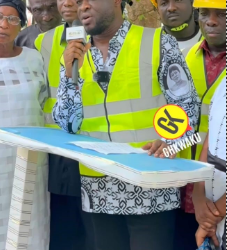Ghana and Nigeria, West Africa’s two largest energy economies, share both significant challenges and promising opportunities. Persistent arrears, unreliable energy supply, and fragile infrastructure have long hindered their mutual goal of achieving energy security.
The dynamics between these countries are most evident in the operation of the West African Gas Pipeline, where Nigeria supplies gas to fuel Ghana’s thermal power plants, thereby supporting Ghana’s electricity needs. However, recurring payment arrears—totaling hundreds of millions of dollars—have repeatedly disrupted this energy flow, resulting in frequent power outages, locally known as “Dumsor.”
The root causes of these arrears are well established: non-cost-reflective electricity tariffs, revenue leakages within distribution systems, and delays in government subsidies.
Consequently, Ghana struggles to meet its financial commitments to Nigeria’s N-Gas and the Nigerian National Petroleum Corporation (NNPC). Nigeria, facing its own fiscal and infrastructure pressures, often responds with supply cuts, which perpetuates a cycle of mistrust and ineffectiveness.
This situation is not only a financial issue but also a structural and regional one, leading both countries to forfeit billions of dollars in unrealized value and leaving citizens and industries to contend with unreliable power and underused capacity.
Nigeria’s Own Reliability Crisis
Nigeria’s power sector is plagued by unreliability, with only about half of households connected to the grid, and just one in ten enjoying consistent electricity. Generation bottlenecks, frequent gas supply interruptions, and transmission collapses mean that, despite installed capacity exceeding 13 GW, less than 4 GW is typically available to the grid.
This lack of reliable power results in significant productivity losses for businesses and high costs for households, many of which rely on expensive diesel generators. The economic toll of these inefficiencies is estimated at 4–7 percent of Nigeria’s GDP annually.
The core challenge is not a lack of energy resources but rather inefficiencies in conversion, management, and payment systems.
A new bargain: Gas for power, power for growth
A new model, the Gas-for-Power Barter Arrangement, presents a bold alternative. Instead of Ghana purchasing Nigerian gas with hard currency, Nigeria could supply Ghana with gas to meet Ghana’s power generation needs.
At the same time, Ghana exports a portion of this electricity back to Nigeria and othern ECOWAS eighbours as payment. In this arrangement, energy works as a circular currency: gas moves from Nigeria to Ghana, and power is returned in exchange.
Ghana’s relatively stable regulatory and investment environment allows it to convert imported gas into reliable electricity, while Nigeria receives dependable, affordable power without further straining its own grid. Gas producers are compensated through a transparent and credible mechanism.
Reviving idle take-or-pay capacity
This approach would also enable Ghana to activate its underutilized “take-or-pay” power plants—facilities that, though contracted, are currently underused and continue to incur significant capacity charges.
Rather than leaving these assets idle, Ghana can repurpose them as export plants to generate electricity for Nigeria and the broader region. Many of these plants are already connected to the grid and have access to gas, allowing for immediate mobilization under bilateral or private contracts.
The revenues generated can be allocated directly to gas payments, operational maintenance, and future investments, turning fiscal waste into productive output.
AI and the data-center dividend
Simultaneously, Ghana’s emergence as a hub for data and artificial intelligence (AI) presents new opportunities. The rise of AI computing, cloud services, and digital infrastructure has fueled unprecedented demand for reliable electricity—demand that is often creditworthy, high-paying, and denominated in dollars.
By anchoring this demand locally, Ghana can stabilize electricity sales for utilities, generate foreign exchange for gas imports, and justify further investments in renewable and hybrid energy sources.
Data centers offer additional efficiency gains. AI-driven analytics can help reduce transmission losses, detect theft, predict faults, and optimize fuel use in thermal plants.
Even a one-percent improvement in efficiency could free up tens of millions of dollars annually—funds that can be directed toward repaying Nigeria and investing in the electricity grid.
Nigeria’s opportunity in Ghana’s stability
Ghana’s relative political stability and secure investment climate make it an attractive destination for Nigerian investors and power developers seeking regional expansion.
Under the Gas-for-Power model, Nigerian entities can build or co-own power plants in Ghana, dedicated to exporting electricity back to Nigeria.
This strategy helps address Nigeria’s domestic electricity shortfall while providing lucrative investment opportunities for its financial institutions, oil companies, and pension funds.
Additionally, Ghana’s Petroleum Hub Project—a multi-billion-dollar initiative to develop refineries, storage terminals, and petrochemical industries—offers a platform for deepening the partnership.
Nigerian capital, technology, and expertise can accelerate the hub’s development, creating an integrated ecosystem of upstream gas supply, power generation, and downstream processing.
The financial strength and liquidity of Nigerian corporations can find secure, high-return opportunities in Ghana, transforming regional competition into shared prosperity.
Building the corridor: From Tema to Lagos
To operationalize this vision, a phased roadmap is proposed:
- Establish a Ghana–Nigeria Energy and Digital Task Force to map arrears, design the barter framework, and coordinate regulatory alignment.
- Launch a Gas-for-Power Pilot using an existing thermal plant (such as Tema Thermal II or Aboadze), supplied by Nigerian gas, with a portion of the power exported back to Nigeria under a clearing mechanism.
- Deploy AI-Enabled Management Systems across ECG, VRA, and GRIDCo to reduce technical and commercial losses and enhance transparency.
- Designate an “AI Energy Park” in Tema or Takoradi to host data centers and digital infrastructure, ensuring a stable power supply from dedicated plants.
- Establish a Gas Payment Stabilization Fund—an escrow account funded by electricity export receipts, data center energy payments, and renewable energy revenues—to guarantee timely payments to Nigeria.
The sticking points: What must be solved first
Despite its promise, this strategy faces several critical challenges:
- Contractual and Commercial Complexity: Repurposing idle take-or-pay plants requires renegotiating existing power purchase agreements and on-take contracts. Export pricing must be cost-reflective and politically feasible, while a credible energy-clearing system is necessary to value gas and power in real time.
- Infrastructure and Technical Readiness: Effective cross-border power trade demands robust interconnectors. The West African Power Pool’s capacity is limited, and some Ghanaian plants may need refurbishment. Nigeria’s gas supply infrastructure also requires improvements in reliability to address issues such as vandalism and low pressure.
- Financial Viability and Investor Confidence: Both Ghana’s and Nigeria’s electricity distribution companies face financial constraints. Mechanisms such as partial risk guarantees and escrow-backed trade finance are essential, and currency volatility must be addressed, possibly through a dollar-based settlement system or regional clearinghouse.
- Regulatory and Policy Alignment: Ghana and Nigeria operate under different licensing, tariff, and environmental regimes. Harmonizing these under ECOWAS and agreeing on data and cybersecurity standards for AI-enabled infrastructure will require considerable time and diplomatic effort.
- Political and Strategic Sensitivities: Both countries need assurance regarding consistent gas supply and payment reliability. Building trust will require joint ownership, transparency, and regional oversight. Political cycles, public opinion, and nationalism are potential risks that must be managed through bipartisan commitment and public education.
Opportunities hidden within the obstacles
Each challenge presents an opportunity. New contract negotiations allow Ghana to redirect costly take-or-pay obligations toward export revenue. Bridging grid interconnection gaps can attract concessional financing.
Regulatory harmonization can expedite ECOWAS energy market integration. Nigerian investment in Ghana’s power and petroleum hub can anchor a new era of cross-border industrialization.
From crisis to competitiveness
The Ghana–Nigeria gas-power dynamic encapsulates Africa’s broader challenge: abundant resources but insufficient collaboration. A reimagined partnership could transform arrears into assets, liabilities into linkages, and debt into development.
By converting gas into power, power into data, and data into revenue, Ghana and Nigeria can shift from transactional disputes to strategic interdependence. Such a partnership would stabilize regional power, create thousands of jobs, and lay the groundwork for Africa’s digital revolution.
The necessary tools, infrastructure, and political relationships are already in place. What remains is the commitment to integrate and the vision to recognize that Africa’s next economic breakthrough may come not from aid or extraction, but from the intelligent combination of energy, technology, and trust.






